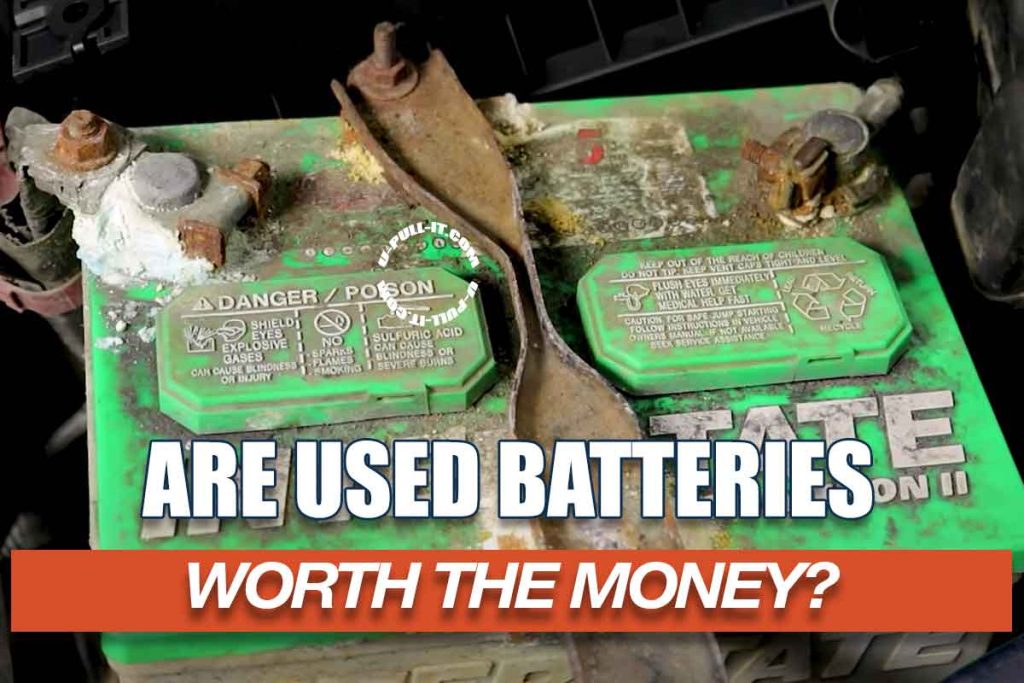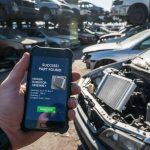When it comes to maintaining your vehicle, the car battery is a component that often gets overlooked. Yet, it’s an essential part of your vehicle’s operation. This guide will provide you with all the necessary information about used car batteries, their benefits, drawbacks, and what to look for when buying one.
Why Consider a Used Car Battery?
Used car batteries can be a cost-effective solution for many drivers. Not only can they save you money, but they also offer an environmentally friendly alternative to buying new. By reusing a battery, you’re reducing waste and promoting recycling.

The Truth About Used Car Batteries
There are many misconceptions about used car batteries. Some people believe they are unreliable or don’t last as long as new ones. However, a well-maintained used battery can provide the same performance as a new one at a fraction of the cost.
The Pros and Cons of Buying a Used Car Battery
Pros
- Cost-effective: A used car battery can cost significantly less than a new one, making it an attractive option for those on a budget.
- Environmentally friendly: Buying used car batteries helps reduce waste and is a more sustainable choice.
- Availability: Used car batteries are readily available at various outlets, including auto parts stores, online marketplaces, and junkyards.
Cons
- Shorter lifespan: Used car batteries may not last as long as new ones since they’ve already been through part of their life cycle.
- Unknown history: It’s often hard to know the exact history of a used car battery, including how well it was maintained or any potential issues it might have.
- Limited warranty: Used car batteries often come with a limited warranty or no warranty at all.
Key Factors to Consider When Buying a Used Car Battery
When buying a used car battery, there are several factors to consider:
- Battery Age: The age of the battery is a crucial factor. A battery that’s less than three years old is generally a safe bet.
- Battery Size and Type: Make sure the battery fits your vehicle and is the correct type. The owner’s manual or a quick online search can provide this information.
- Battery Brand: Some brands are known for their reliability and longevity. Do some research to find out which brands are highly rated.
- Signs of Damage: Inspect the battery for any signs of damage or leakage. Check the terminals for corrosion.
- Checking the Voltage: A healthy car battery should have a voltage of around 12.6 volts when the vehicle is off. You can check this with a multimeter.
Recharging a Dead Battery
Recharging a used car battery is a straightforward process, but it requires some care. First, you’ll need a battery charger suitable for your battery type. Always ensure your vehicle is turned off before you begin.
Start by connecting the positive (red) cable from the charger to the positive terminal on the battery. Then, connect the negative (black) cable from the charger to the negative terminal.
Once the charger is connected, plug it into a power outlet and turn it on. Most chargers have an indicator light that will show when the battery is fully charged. It’s important not to overcharge the battery, as this can cause damage.
Once the battery is fully charged, turn off the charger before disconnecting the cables, starting with the negative cable. Always refer to the instructions provided with your specific charger, as procedures can vary.
Using Coca-Cola to Clean an Old Rusty Car Battery and it’s Terminals.
Coca-Cola, a household staple and popular beverage, has a surprising use in the realm of car maintenance. It can be used to clean corroded car batteries and terminals. The secret lies in the acidic properties of Coca-Cola. It contains phosphoric acid, a relatively weak acid but potent enough to dissolve rust and corrosion.
When a car battery corrodes, it’s typically due to a buildup of battery acid leakage around the terminals. This buildup can hinder the flow of electricity from the battery to the rest of the car, causing issues like difficulty in starting the vehicle. In severe cases, it can even damage the battery cables.
Here’s where Coca-Cola comes in. When poured over the corroded areas of a battery, the phosphoric acid in the beverage reacts with the corrosion, breaking it down. This is why you’ll see the Coke bubbling on contact with the battery terminals – it’s the battery acid reacting and neutralizing the corrosion.
Cleaning a car battery with Coca-Cola involves a few simple steps:
- Disconnect the Battery Cables: Start by disconnecting the battery cables using the correct size wrench. Always remove the negative cable first, then the positive to avoid any potential shock.
- Apply Coca-Cola: Pour a small amount of Coca-Cola over the corroded areas. The acid in the Coke will bubble and eat away at the rust and corrosion, neutralizing it.
- Brush Away Corrosion: Once the Coke has finished bubbling, use a wire brush to scrub away any remaining corrosion, especially around bolts or other hard-to-reach areas. The wire brush will also help work the Coke into these areas, breaking up any hidden corrosion.
- Clean the Area: After all the corrosion has been brushed away, wipe the area with a paper towel to remove the Coke residue and any remaining corrosion. Rinse the area with a small amount of water to remove any sticky residue from the Coke and any remaining corrosion. Dry the area thoroughly to soak up any remaining residue.
- Reconnect the Battery Cables: Finally, replace the battery cables, starting with the positive and then the negative. The negative cable should spark when it is connected, indicating that the connection is complete.
It’s worth noting that while Coca-Cola can be a handy quick fix for battery corrosion, it’s not a substitute for proper car maintenance. Regularly check your car battery for signs of corrosion and clean it as necessary.
The Reasons Why There is Corrosion Build-up on a Car Battery and its Terminals
Corrosion in automotive batteries and their terminals is primarily caused by the release of hydrogen gas from the sulfuric acid inside the battery. When this gas reacts with the surrounding atmosphere, it creates a corrosive environment. Moisture and salts can accelerate this process.
Corrosion typically occurs on the negative battery terminal, which is a symptom of undercharging the vehicle’s battery. This can happen if you go for short drives while running many electrical components, such as wiper blades and the radio, which put a lot of draw on the battery.
The alternator doesn’t have enough time to fully charge the battery, leading to the buildup of corrosion on the negative terminal. Conversely, corrosion on the positive battery terminal is due to an overcharging condition. If you drive for a long period of time, especially on the highway, and the alternator keeps charging the battery without a lot of electrical draw from the vehicle, the battery can become overcharged.
This is especially likely if you have a bad voltage regulator inside your alternator. This overcharging can lead to the battery venting out hydrogen gas, which can accumulate on the battery and cause corrosion.
Understanding Battery Life and Warranty
The lifespan of an auto battery depends on several factors, including the type of battery, the climate, and how the vehicle is used. On average, an auto battery lasts between 3 to 5 years. However, some high-quality batteries can last up to 6 or 7 years.
When buying a used battery, it’s essential to ask about the warranty. Some sellers offer a limited warranty that covers defects and other issues.
How to Determine a Fair Price for a Used Car Battery
The price of a used car battery depends on its age, condition, and brand. On average, you can expect to pay between $30 and $50 for a used car battery. However, premium brands may cost more.
Where to Buy Used Car Batteries
Used car batteries can be found in various places:
- Junkyards or Salvage Yards: These places often have a wide selection of used car parts, including batteries.
- Online Marketplaces: Websites like eBay and Craigslist often have used automotive batteries for sale. –Reliable Sellers: Some auto parts stores sell used car batteries that have been tested and certified.
How to Properly Install a Used Car Battery
Installing a used car battery is a straightforward process, but it’s essential to take safety precautions. Here’s a step-by-step guide:
- Turn off your vehicle: Make sure your vehicle is off and the keys are out of the ignition.
- Remove the old battery: Start by disconnecting the negative terminal (usually black or marked with a minus sign), followed by the positive terminal (usually red or marked with a plus sign). Remove any clamps or screws holding the battery in place and carefully lift the battery out of the vehicle.
- Prepare the new battery: Clean the battery tray and cable connectors using a wire brush and a mixture of baking soda and water to remove any corrosion. Rinse with clean water and dry thoroughly.
- Install the new battery: Place the new battery in the tray and secure it with the clamps or screws. Connect the positive terminal first, then the negative terminal. Make sure the connections are tight.
- Test the new battery: Start your vehicle to make sure the new battery is working correctly.
If Car Batteries Are 12v, What Are 6v, 24v, and 36v Used For?
Different voltage batteries are used for different types of vehicles and equipment. Here’s a brief overview:
- 6V Batteries: These are often used in smaller vehicles or devices, such as classic cars, golf carts, some types of lawn mowers, and certain types of children’s electric toys. They are also commonly used in RVs and boats for powering certain types of equipment.
- 24V Batteries: These are typically used in commercial vehicles, such as trucks and buses, as well as in industrial equipment and machinery. They are also used in some types of renewable energy systems, such as solar power setups.
- 36V Batteries: These are commonly used in forklifts, golf carts, and other types of electric vehicles. They are also used in some types of large-scale renewable energy systems.
It’s important to note that the voltage of a battery doesn’t necessarily indicate its power or performance. Instead, it’s more about compatibility with the vehicle or device it’s being used in. Always make sure to use the correct voltage battery for your specific vehicle or equipment to avoid potential damage.
Conclusion
Buying a used car battery can be a cost-effective and environmentally friendly option. However, it’s essential to do your due diligence to ensure you’re getting a battery that’s in good condition and will serve you well. Remember to consider the battery’s age, physical condition, capacity, and power, and don’t forget to have it tested before you buy. With proper care and maintenance, a used car battery can be a worthwhile investment for your vehicle.
FAQs
Does AutoZone Recycling Program buy used batteries?
Yes, AutoZone offers a battery recycling program. They may offer a store credit for your old battery.
Is it OK to touch car battery terminals?
It’s safe to touch the terminals of a car battery with your hands, but it’s not recommended to touch them with any metal object as it can cause a short circuit.
Is a used car battery useful or a waste?
A used car battery can be very useful if it’s in good condition. It can provide the same performance as a new one at a fraction of the cost.
Can car batteries be used for a truck?
It depends on the size and power requirements of the truck. Some trucks can use the same type of battery as cars, while others may require a more powerful battery.
Where can I buy a used car battery for cheap?
Used car batteries can be found at auto parts stores, junkyards, and online marketplaces like eBay and Craigslist.
Does AutoZone give money for old batteries?
AutoZone may offer a store credit for your old battery as part of its battery recycling program.
Where should I dispose of an old car battery?
Old car batteries can be recycled at many auto parts stores, recycling centers, and some service stations.
What is the average price of used car batteries?
The price of a used car battery can vary depending on its age, condition, and brand, but on average, you can expect to pay between $30 and $50.
Will an old charger work for a new car battery?
Yes, as long as the charger is functioning correctly and is suitable for the type of battery you have.
How do I replace a car battery terminal?
Replacing a car battery terminal involves removing the old terminal, cleaning the battery post, and installing a new terminal. It’s a relatively simple process, but taking safety precautions is important. Here is a video showing you how to replace a car battery terminal.
Where to find the cheapest NEW car battery?
You can find affordable car batteries at various online and physical stores. Walmart, Amazon, and AutoZone are popular choices due to their competitive pricing.
How long will a car battery last unused?
An unused car battery can last up to two months without needing a charge, but this can vary based on the battery’s condition and age.
How old should a car battery be when you buy it?
Ideally, a new car battery should not be more than six months old from the date of manufacture.
What is the best car battery replacement cost?
The cost of replacing a car battery can range from $50 to $200, depending on the brand and type of battery.
Is it OK to buy cheap batteries?
While cheap batteries can be tempting, they may not provide the same longevity and performance as more expensive, quality batteries.
Who makes the cheapest car battery?
Brands like ValuePower and EverStart often offer more affordable options.
Does AutoZone charge batteries for free?
Yes, AutoZone offers free battery charging services.
Are there fake car batteries?
Yes, counterfeit car batteries exist. They are often sold at drastically lower prices, but they lack the quality and longevity of authentic batteries.
Does it matter what car battery you buy?
Yes, it does matter. The type of car battery you buy should match your vehicle’s specifications and driving needs. The right battery ensures optimal performance and longevity.
Does car battery brand really matter?
Yes, the brand of a car battery can make a difference. Top brands often offer high-quality batteries that provide reliable performance and longer lifespans.
Which brand of car battery lasts the longest?
The longevity of a car battery can vary by brand. Brands like Optima RedTop, DieHard Platinum, and ACDelco Gold are known for their long-lasting batteries.
Are generic batteries just as good?
While some generic batteries can offer decent performance, they may not match the power and lifespan of name-brand batteries. It’s important to consider the quality and reliability of the battery, not just the price.




